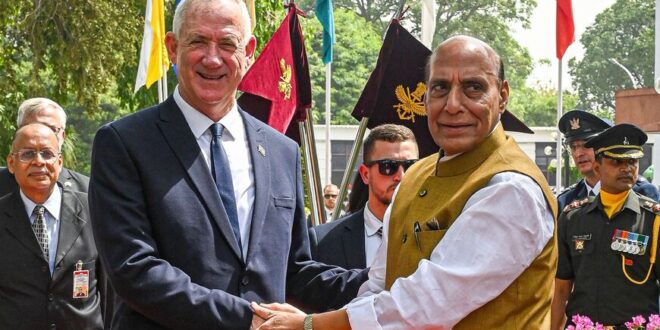Defense Minister Benny Gantz’s twice-postponed trip to India that finally took place last week.
Israeli Defense Minister Benny Gantz visited India June 2, marking 30 years of diplomatic ties between the two countries and seeking to expand their flourishing defense relationship. Gantz met with Prime Minister Narendra Modi and Defense Minister Rajnath Singh as well as national security adviser Ajit Doval.
Gantz’s Chief of Staff Mayaan Israeli, head of the International Defense Cooperation Directorate at Israel’s Defense Ministry Yair Kulas, IDF Political-Military Bureau head Dror Shalom, Military Secretary Brig. Gen. Yaki Dolf, Israel’s defense attache to India Col. Asaf Maller and Israeli Ambassador to India Naor Gilon were all part of the delegation.
Gantz was originally supposed to visit India at the end of March/beginning of April, but just days prior to his planned departure, his office discovered that Prime Minister Naftali Bennett was scheduled to visit India very shortly before him. Gantz’s office announced plans to move up his Delhi visit to precede Bennett’s by four days.
Ultimately, neither one of them ended up going then. Bennett succumbed to COVID-19 and a wave of deadly terror attacks in Israeli urban centers kept Gantz at home to deal with the fallout. Bennett’s visit has been postponed indefinitely.
Gantz’s trip was rescheduled for June 1, but hours before his departure, the opposition made it clear no one would offset him by abstaining from a crucial Knesset vote, forcing him to stay in Israel one more day.
This last schedule change shortened the visit to 24 hours. Still, Gantz’s associates made it clear the minister considered the visit highly important for Israel’s security and accused Likud legislators of harming Israel’s security interests by delaying the trip.
In their meeting, Singh and Gantz discussed international strategic issues as well as enhancing military cooperation including joint drills and defense industry projects. A statement by the Indian Defense Ministry said the two sides signed a “vision statement” on defense cooperation with the “intention to further strengthen the existing framework of the Indo-Israeli defense cooperation architecture.”
A memorandum of understanding on expanding cooperation on weapons research and development, including drones and anti-missile defenses, was signed between India’s Defense Research and Development Organization and Israel’s Directorate of Defense Research and Development.
“During the meetings, the ministers agreed on their intention to develop the security ties between the countries — the security cooperation, which combines Israel’s technological capabilities and operational experience together with India’s production and knowledge capabilities,” read a statement released by Israel’s Defense Ministry.
“By working together, we may increase our capabilities and ensure the security and economic interests of both countries,” said Gantz after the meetings, adding, “India is an industrial superpower and Israel is a technological superpower — cooperation between our countries will expand the capabilities of both countries to contend with developing challenges.”
Gantz’s visit reflects the close and deepening ties between the sides, especially since Modi took office in 2014 and became the first Indian premier to visit Israel in 2017 to discuss wide-ranging economic and security cooperation.
Modi’s trip to Israel was marked by his friendly relationship with Prime Minister Benjamin Netanyahu, who then visited India in 2018. When Naftali Bennett took office in 2021, he made it clear he intends to follow the same path and bring ties with India to an even higher level. Thus, in October 2021, The India-Israel joint working group on defense cooperation set up a task force to create a 10-year road map on areas of collaboration.
India is one of the Israeli defense industry’s biggest clients, buying over $1 billion worth of arms annually and highly interested in advanced technologies for its navy and air force.
In one of the major deals between the sides in recent years, Israel and India jointly developed the Barak 8 system, which can intercept aircraft, low-flying anti-ship and cruise missiles and stealth targets.
India and Israel have also conducted several joint exercises in recent years, with Indian pilots participating last year in the international Blue Flag drill hosted by Israel.
During the COVID-19 pandemic, Israel and India conducted a series of joint experiments on diagnostics. Both countries intend to continue their scientific and medical cooperation beyond the pandemic.
 Eurasia Press & News
Eurasia Press & News




